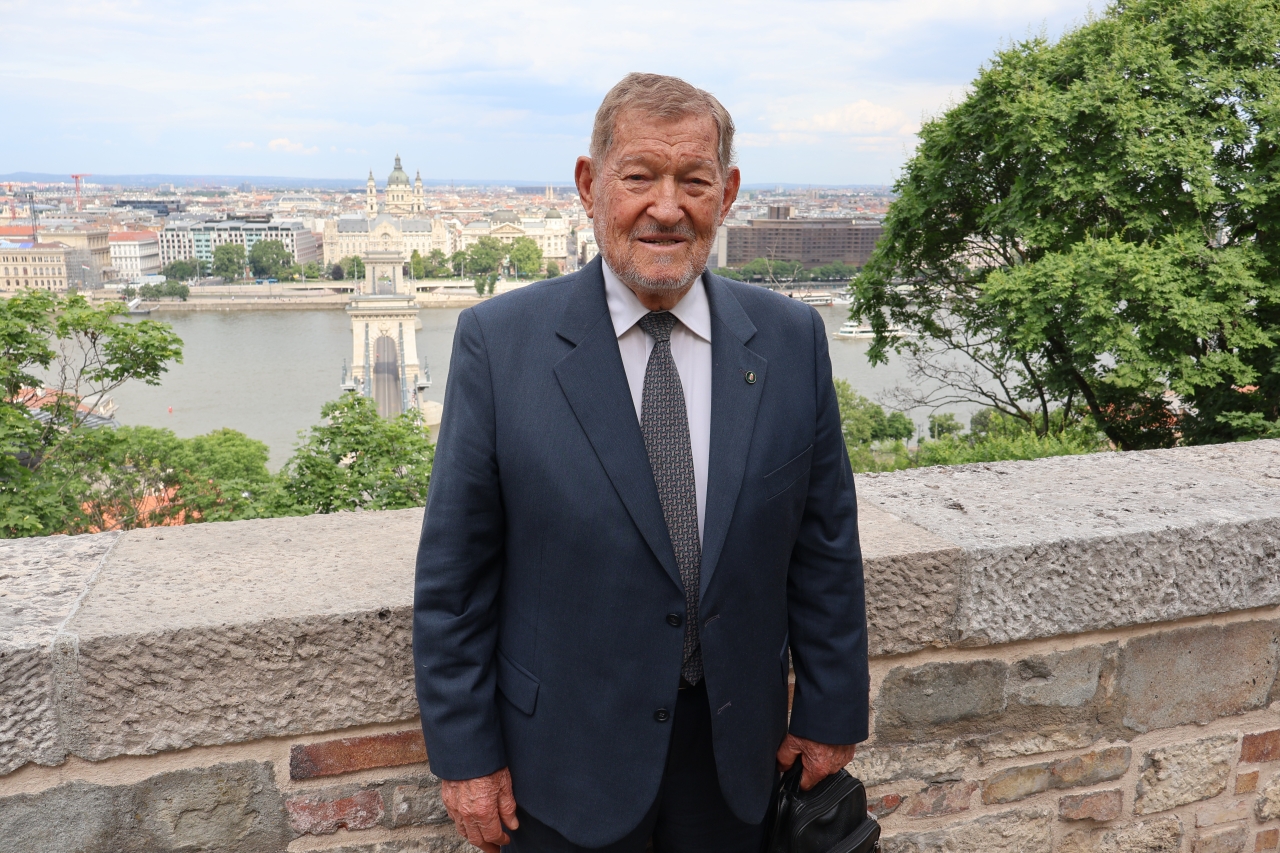
We asked the Real Madrid legend about his life, today's Champions League final, and the future of Hungarian soccer.Continue reading
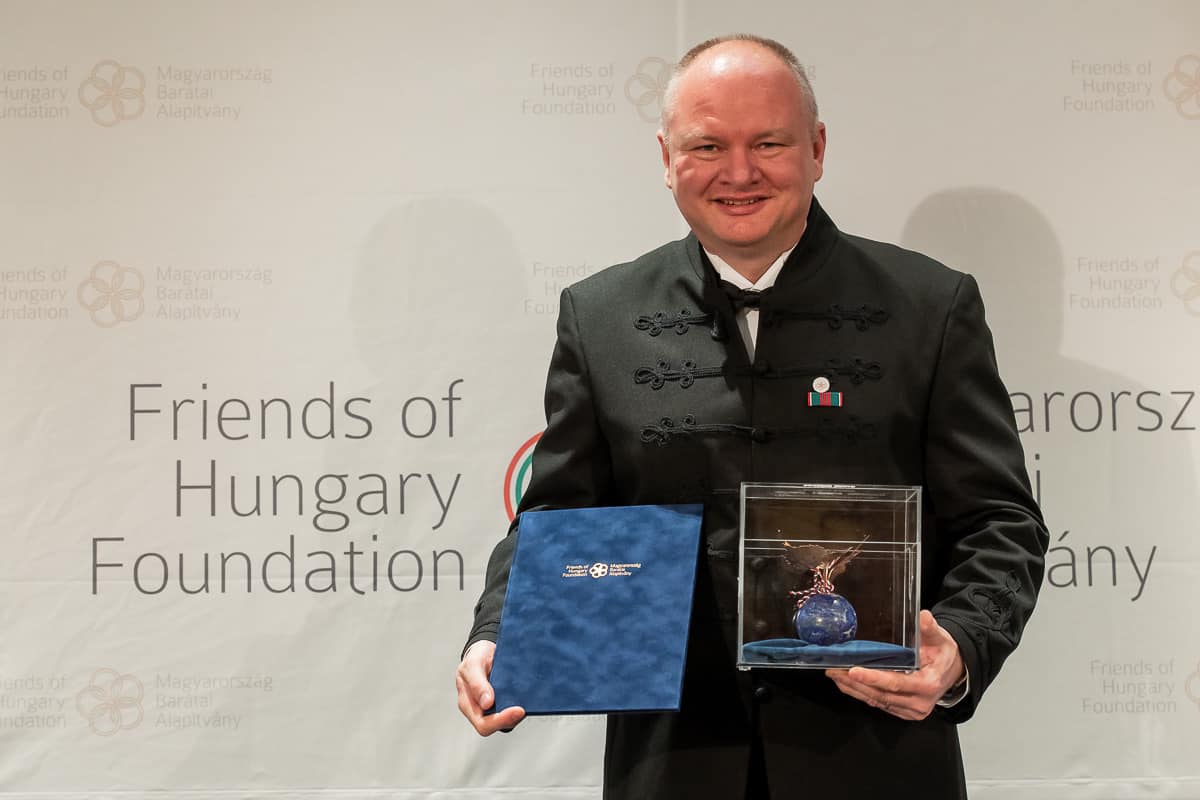
The Friends of Hungary Foundation, publisher of our news portal and our sister site Ungarn Heute, presented the Friends of Hungary Award for the seventh time during its annual conference in May. Bocskai Radio was honored with the award in recognition of its commitment and perseverance in promoting Hungarian identity and culture. The radio station was founded in 1984, to provide Hungarian news to the Hungarian population in the Cleveland area. Therefore, the award is especially meaningful to the radio station as it celebrates its 40th anniversary this year. We asked Zsolt Molnár, the director of Bocskai Radio, about its origins, its development in recent years, and the importance of radio for Hungarians in the motherland and in the diaspora.
You were born and raised in Transylvania and emigrated to America after a series of personal tragedies. You cultivated and maintained your Hungarian identity abroad just as you did at home. How did you decide to go to America?
I was born in Marosvásárhely (Târgu Mureș – editor’s note), and when I was still young, we moved to Brassó (Brașov – editor’s note), where I went to a mixed school, half Hungarian, half Romanian. It was here that I first experienced what it means to be Hungarian. The Romanian children were literally beating it into me, during school breaks I often had to physically fight to make sure I belonged here. Later we moved to Kolozsvár (Cluj-Napoca – editor’s note). Here I came into contact with the Hungarian church and took part in many events. For example, I organized the first national Baptist youth conference in Transylvania, which brought together 1,000 young people from all over Transylvania. This was a big deal. With my involvement, a newspaper was also published in Kolozsvár, for which I did not write the articles myself, but I was able to motivate people to give an interview or write an article. It became a small weekly newspaper that was always distributed after the church service.
The newspaper was called Community, which meant a lot to me even then. Community, both the Hungarian community and the church community, means that people are together and do something together.
We often spent our vacations in America, as my wife’s sister had emigrated to America, to Cleveland, long before us. Once, at her sister’s insistence, my wife said that she did not want to go back. I do not know how best to describe it, let us just say the reason I went to America was to reunite the family. But I was also looking for adventure, for whatever reason. I just wanted to know more and see more of the world.
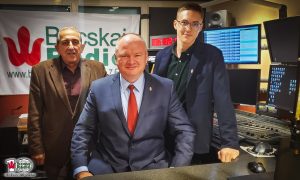
Zsolt Molnár (C) with László Strober (L) and Áron Erdélyi, fellow of the Bocskai Radio Kőrösi Csoma Sándor Program (R). Photo: Facebook/Bocskai Rádió the Voice of Hungary at WJCU
In America, it was anything but easy at first. Did you get help from the Hungarian community? How strong is the cohesion within the American-Hungarian community, what personal experiences have you had with it?
As I said, our family was already living in America, thus we came into contact with Hungarian people quite quickly, and yes, we got help with finding a job, as an example. No matter what problems we had, there was always someone we could turn to within the Hungarian community or church, it was no problem at all.
I believe that Hungarians here have a very strong sense of cohesion, and the churches play a big role in this, because they are the bastions that hold us Hungarians together.
The reason for this is that churches have physical presence – buildings and places – where people can gather. The churches often include Hungarian schools and Hungarian scout associations, which can thus work hand in hand to cultivate Hungarian culture and secure their existence. Communities where there is no Hungarian community center or Hungarian church are usually in a weaker position, where only the very determined can meet and do something.
In the early days of its existence, the radio station broadcast traditional Hungarian music and reported on events in Hungary to Hungarians abroad. How and where did the idea of a radio come from?
There used to be many Hungarian radio stations and even television in the Cleveland area. The predecessor of Bocskai Radio, then called Kossuth Radio, was founded by a young man at John Carroll University named András Tóth. The name Kossuth came in handy because our historical hero, Lajos Kossuth, had visited Cleveland on his triumphal tour to America in 1852, and his name was familiar to some American students.

John Carroll University, Photo: Facebook/John Carroll University
András’ efforts were supported by other students at the university who spoke Hungarian well. When László Berta and Kálmán Elek took over the radio station (in 1989 – editor’s note), the name of the radio was changed from Kossuth to Bocskai Radio. (István Bocskai was Prince of Transylvania from 1557, and Prince of Hungary from 1606 – editor’s note.)
The local printing houses had very good relations with Hungary at the time, and they were actually the ones who made the news. Back then, it was a big deal for a normal citizen to send a fax from Hungary.
They cut the news out of newspapers and transmitted it by fax. This went on until I arrived with my team, which was in 2012.
At that time, the internet was already so widespread that most listeners already knew the news we read out. I considered this unnecessary and started producing so-called local news.
Under your management, the program has expanded considerably with the help of the Internet, and you also work together with other Hungarian community organizations. How many contributors do you have and what is the main aim of the broadcasting station today?
There used to be little coverage of events, now it is really all about that. During COVID, I was also forced to do a lot of online interviews, and this is how our video broadcasts started. Nowadays, I can do a video interview anywhere in the world at any time, which is broadcast directly via our radio network. For example, last week I was in Florida and next week I am traveling to Toronto. We also stream on Facebook so that everyone around the world can enjoy our program.
One of my personal goals when I started working on the radio was that every Hungarian organization should have a small part in the radio broadcast. For instance, there are five communities here in the area and each community takes turns broadcasting half an hour of music or other programs once a week.
What was particularly close to my heart was the collaboration with the scouts, and after much persuasion they decided to take over the editing of the monthly program of the popular scout radio.
I would have liked to see the same model with other organizations, but unfortunately no one could be found to take over a program. However, we have good and close contact with all the associations and report on their events so that as many people as possible can take part. We are also often invited to conduct interviews, or if an event has been organized, we receive information about it and can report on it. I often say to Hungarian journalists that we could even make news about Hungarian chicken goulash. (laughs)
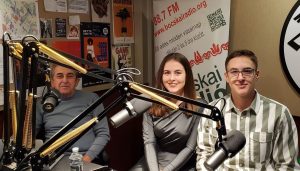
Bocskai Radio staff: László Strober, Zsófia Dorgay, and Áron Erdélyi. Photo: Facebook/Bocskai Radio the Voice of Hungary at WJCU
There are four of us who are in the newsroom every Sunday. My close colleague is László Strober, who has been with us from the beginning and is always in the studio. Having someone with me is much better, because then I can talk to them, and we can engage in discussions. I always try to put myself in the other person’s position so that we have a point to talk about. But there are a lot of colleagues who go out, record, do interviews. We also have contributors who support us with their work from Hungary.
The main purpose of the radio is to connect people, first here within the community, to make things as successful as possible, to keep the community as close as possible. At the same time, we also want to be a bridge that connects us with the Hungarians in the Carpathian Basin.
Hence, we have our website, and that is why our radio is always available online, so that the Hungarians at home, in the Carpathian Basin, know that Hungarians live and work here too.
Your mentor, László Böjtös, once told you that you could do much more for Hungary as an emigrant than if you had stayed in Transylvania. In your opinion, how important is radio for the American-Hungarian community? Are the Americans in Cleveland aware of its importance?
I have to say that I am a born Szekler and we Szeklers are not just Hungarians, we are more than that. Unlike in the motherland, where you can live your Hungarianness naturally, in Szeklerland we must fight every day to be Hungarians, and I want to continue this idea. I came to America with this sense of identity. Here I have met Hungarians who have never been to Hungary and still consider themselves Hungarian. I have even met Hungarians who do not speak a word of Hungarian and yet do everything they can to maintain their Hungarian identity.
This new Hungarian identity that I have come to know here has really touched me, and I want to offer something to these people on some level.
It is true that with radio we only reach a very small segment of people who still want to preserve their language, but I think it is very important. If I can remind people here of their mother tongue, if I can do something to ensure that they do not forget the Hungarian language abroad and continue to cultivate it, then that is what I will do.
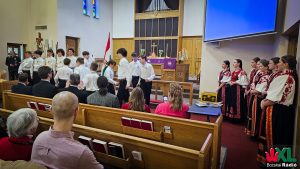
Commemoration of the Revolution of 1848/49 and the War of Independence at the West Side Hungarian Reformed Church in Cleveland. Photo: Facebook/Bocskai Rádió the Voice of Hungary at WJCU
Regarding the importance of radio, I would say that it is the same as with everything else. People only start to appreciate something when it is no longer there. It is like the air we breathe. Unfortunately, we do not remember to thank God every day for allowing us to breathe the air. I think it is the same with the radio. Everyone here takes it for granted that Zsolt Molnár and his colleagues exist. For this reason, I do not feel that there is a great need for it, but if it were to cease to exist, I am sure that many people would miss it. We have received many awards with our radio, and this definitely gives us positive feedback and recognition that people appreciate our work. After 12 years of voluntary work, I sometimes feel like I have run out of energy, but this feedback gives me the confidence to carry on.
Did you have any contact with the Friends of Hungary Foundation before receiving the award? What does the Friends of Hungary Award mean to you personally and what does it mean for your radio?
Of course, I know the Friends of Hungary Foundation, I have interviewed the president E. Sylvester Vizi several times. Interestingly, I have also interviewed many of those who have received this award. We follow your conferences regularly because the Friends of Hungary Foundation is concerned with Hungarians in the diaspora. This is a big deal for us. I would even describe you as an umbrella organization that brings Hungarians around the world together. For example, there is the Hungarian American Coalition or the American Hungarian Federation here, but you are even above that, because you reach from Australia to America, or from the northern countries of Europe to the tip of Africa, trying to bring people together.
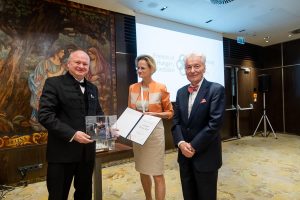
Zsolt Molnár receiving the Friends of Hungary Award from Ambassador Enikő Győri and Foundation President E. Sylvester Vizi. Photo: Facebook/Bocskai Rádió the Voice of Hungary at WJCU
For me personally, this award means that we are even more widely recognized, because after many other awards, even the largest organization takes notice of our work, and the whole radio staff benefits from this recognition.
Via Ungarn Heute, written by Katharina Haffner; Featured image: Facebook/Bocskai Rádió the Voice of Hungary at WJCU